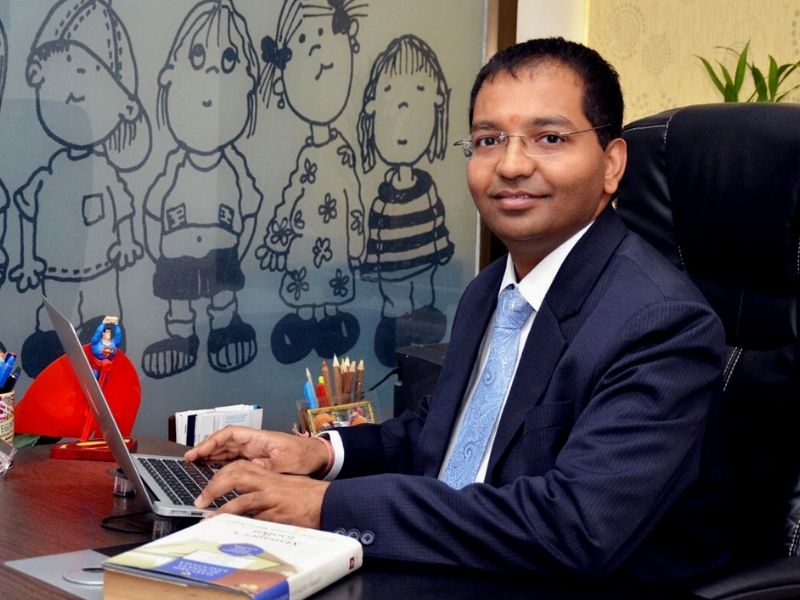Academicians, researchers and ed-tech platforms have responded to the announcements made by finance minister Nirmala Sitaraman in the Union Budget 2022 on Tuesday. Most of the education leaders have welcomed the budget announcements for the sector, calling the digital boost and emphasis on rural education a much-needed announcement, here are some reactions:
School education:
 Shweta Sastri, Managing Director, Canadian International School
Shweta Sastri, Managing Director, Canadian International School
The push to regional education is welcome as this will once again enable people in the rural areas to access quality education in their languages. Another welcome decision on the digital university is that it will expand the reach of education to the masses as it will follow a hub and spoke model and emphasize the role of ICT in digital education. The focus on skill training by ITIs will also enable students to be employable in the future. The budget has addressed structural issues in the education landscape and has ensured that all children get access to education. The budget has also well-coincided with the opening of schools as it is important to reverse the learning loss among students.
 Niru Agarwal, Trustee, Greenwood High International School
Niru Agarwal, Trustee, Greenwood High International School
Establishing a Digital university and over 200 channels covering multiple regional languages under the One class, one TV channel’ program are two very innovative and path-breaking initiatives that will enable students across the country to access quality education far and wide through the hub and spoke model. The development of quality e-content to empower and equip teachers with digital tools of teaching and facilitating better learning outcomes is a welcome measure to help children. With the challenges of the online learning arrangements, the government’s decision to enhance digital learning with E VIDYA will be a boost to the education sector.
Yeshwanth Raj Parasmal, Co-founder, 21K School
 The Finance Minister has unveiled a Budget that aims to bridge the economic gap between India and Bharat. The proposed policies are an inspiring start in what will hopefully provide stimuli for continued growth, leading us closer towards our goal of achieving sustained acceleration! The announcement of Digital University is most welcome and in line with the trend of online schools across the country. But, it misses the opportunity to leapfrog with more significant innovation and investment for improved access, equity and affordability. The structural flaws of the education sector and problems on the ground could have been addressed.
The Finance Minister has unveiled a Budget that aims to bridge the economic gap between India and Bharat. The proposed policies are an inspiring start in what will hopefully provide stimuli for continued growth, leading us closer towards our goal of achieving sustained acceleration! The announcement of Digital University is most welcome and in line with the trend of online schools across the country. But, it misses the opportunity to leapfrog with more significant innovation and investment for improved access, equity and affordability. The structural flaws of the education sector and problems on the ground could have been addressed.
 Ryan Pinto, CEO, Ryan International Group of Institutions
Ryan Pinto, CEO, Ryan International Group of Institutions
“We welcome the decision made by our honorable Finance Minister in the Budget for 2022 -2023. It is a positive move focused on leveraging the digital transformation in Education Sector. Two years of education regression faced by schools and students need reforms to bridge the gap created. The challenges faced during online classes and tech-based platforms to go digital suddenly was a task. ‘One class, one TV channel’ program of PM eVIDYA for school children and the establishment of a digital university is an expansion to help students across the country to a larger extent. It is commendable that it will also provide a supplementary Education in regional language.”
Venkat Muriki, Founder – Director, Excellencia Colleges and Schools
“The Union Budget 2022 had several factors that focused on skill development and education. Reskilling and Upskilling is a critical part of building the workforce of the future. Additionally, the ‘One Class One TV Channel’ is a very important move towards enhancing access to primary and secondary education. The pandemic has shown us the importance of having an infrastructure to reskill, that is independent on physical infrastructure. There are hundreds of new jobs that will be opening up in the future – and the measures announced today will help prepare our children for that future. We are also awaiting to see if there would be further announcements towards private education’.
Dr. Tristha Ramamurthy, Founder & Managing Director, Ekya Schools, and Provost, CMR University
This year’s budget will bring a revolutionary change to the education sector as it can support the capacity building of teachers and school leaders across the country. Investing in teacher education through the training of teacher educators and implementation of robust institutions for teacher training and education will create a high-quality education system in the country. The establishment of a Digital University and over 200 channels covering multiple regional languages under the ‘One class, one TV channel’ program are two very innovative and path-breaking initiatives that will enable students across the nation to access quality education through the hub and spoke model. The development of quality e-content to empower and equip teachers with digital tools for teaching and facilitating in order to achieve better learning outcomes is a welcome measure. Taking into account the challenges of the online learning arrangements, the government’s decision to enhance digital learning with E -VIDYA will be a boost to the education sector.
Higher Education:
– Sumanta Datta, Managing Director, Oxford University Press (India)
“The Union Budget aptly sets the tone for strengthening of the education sector to become ready for a future that will clearly be dominated by digital technology. The Government’s focus on ramping up efforts in digital education and skill-building will provide much-needed thrust to the sector that plays a fundamental role in nation-building, and aid all stakeholders to achieve the goals outlined in the NEP 2020. The future of education is the fading of physical barriers and hybrid (blended) forms of learning to thrive – a move away from one-size-fits all solutions, because there is no ‘correct answer’ in the debate of online and offline education. But for blended education to thrive, we need to address the infrastructure needs, otherwise we will quickly exit one era of inequality to another one. In a recent OUP report titled ‘Addressing the Deepening Digital Divide’, 56 per cent of the teachers believed that the lack of digital skills on the part of both learners and educators prevented their effective use of digital resources and acted as a barrier to learning.”
Prof Pramod Kumar Jain, Director, IIT BHU (Varanasi)
We welcome the move taken for the education sector in the budget 2022. As the pandemic had a large impact on the education sector, technology adoption showcases a positive move towards its development. Aiming to boost quality education in India, the government has announced developing a Digital University and catering towards e-content and e-Vidya initiatives. The government is also inclined to focus on supplementary education available in regional languages and telecasted in radio, TV, and digital platforms, hence targeting wider outreach of quality education in rural and village areas. Lastly, this big announcement is in sync with the National Education Policy giving the use of technology to enhance learning, assessment, and planning both for school and higher education.”
Prof. VP Singh, Professor of Economics & PGDM Program Director, Great Lakes Institute of Management, Gurgaon
Digital economy needed a thrust on digital education and that’s been proposed in this budget. Technological innovations in other sectors need to be complemented with innovations in education for yielding the desired growth in employment and economic development. The proposals on Digital Desh Digital University will make education available anywhere anytime at low cost. India will see a new revolution in productivity through this confluence of enablers of investments in skilling, logistics, infrastructure, financing and youthfulness. Pandemic increased the divide between rich and poor in terms access to education. The proposals will bridge this gap and provide opportunities of continuous learning for those who missed out on formal education in the last two years.
Sudarshan Suchi, CEO, Save the Children
“It’s encouraging to see recognition of a gap in learning outcomes and devising a part strategy to combat learning loss enhanced due to the pandemic. Steps like supplementary teaching and continued focus on One Class One TV through PM e-Vidya expanding to 200 channels with a dedicated focus on regional languages for classes up to 12th can make a big difference, ensuring recovery of learning loss. This initiative needs to be complemented by Safe Back to School and face-to-face quality education. It is critical the initiative reaches the most marginalized children having limited access to technology. Simultaneously, aligning NSQF with industrial needs must also focus on skilling for development professionals including frontline workforce such as AWWs (with special focus on FLN skills), Healthcare and Child Protection Workforce for effective service delivery for the most marginalised children. However, there is no specific budget allocation for Early Childhood Education (ECE). Save the children demands specific allocation ranging between 1.5 to 2.2% of GDP for ECE.”
Dr. Pradeep K. Sinha, Director IIIT Naya Raipur
Due to the pandemic, the world has realized the important role that online education can play in augmenting conventional education system. This realization is also visible in Budget 2022. The increased focus on strengthening the IT infrastructure of the country is a step towards strengthening our online education system. The establishment of a Digital University to provide access to world class quality education is yet another step in this direction. One TV channel in every classroom and disseminating knowledge to the students of rural India in online mode will be possible through quality e-content and reliable IT infrastructure only, which is a focus area of the current budget. Emphasis on skilling programs for the youth shall help in generating easily employable manpower in future.
Rohan Parikh, Managing Director – The Green Acres Academy
“The Indian Government as shown by the budget and the incredible display at the Republic Day Parade has rightly assessed the need for technology in education. It is good to see us ready to leapfrog from industrial revolution inspired classrooms to real hybrid centers of learning. The move to use television as a medium is interesting and will really depend on the quality of execution. The same applies to technology in education. I hope to see continued government support in tech investment in schools. However, we need to be careful of using “tech for tech’s sake” vs simple and non-sexy technologies that really boost learning in the classroom.”
Balasundaram Athreya Business Head, Manipal MedAce & Sr. VP, Manipal Global Education Services
“Overall, this year’s budget appears to be forward-looking, building on ongoing efforts to aid in implementing the National Education Policy. The vision of Budget 2022 for the Education sector’s modern outlook and approach will open opportunities towards reinvigorating digital empowerment and paving a roadmap for India’s advancement. It is reassuring to see that the Digital University’s ‘hub and spoke’ model intends to deliver classes in all regional languages; it is a commendable step towards strengthening digital infrastructure and training and is key to achieving real progress in the education sector. We have come a long way to ensure equal access to education for all. However, given the pandemic, we risk losing this momentum and progress. We applaud measures proposed in this year’s budget, such as the Digital DESH e-portal, Centers of Excellence that would assist in Urban Sector Development, and skilling programmes and collaborations, hoping to strengthen our education system.”
Edtech sector
 Sumeet Mehta, Co-founder and CEO, LEAD
Sumeet Mehta, Co-founder and CEO, LEAD
“Overall, this has been a progressive budget as it accelerates the government’s efforts towards inclusive and sustainable development. As an educator, I welcome the emphasis on creating digital and free-to-air channels of education. However, at the same time, the budget appears to circumvent physical schooling. I sincerely hope that is not the case. While online learning was inevitable due to the Covid-19 pandemic, it would never be as effective as offline learning, which brings out the best in students in terms of learning outcome and performance. Online education can at best only play a supplementary role in education. I would have also loved to see a greater focus on improving the teaching and learning processes in our schools vis-a-vis infrastructure and tech-enabled curriculum. Going forward, I hope there will be policy changes in that direction.”
Vivek Prakash, Co-founder and CEO, Codingal
“Education has been among the worst-hit sectors by the pandemic and we support the government’s vision of promoting an inclusive education ecosystem through initiatives under eVidya. Emphasis on digitalisation in the learning system with quality e-content across all Indian languages will truly democratise learning and reach to the nooks and corners of the country.We hope India’s edtech players will be able to contribute meaningfully in helping India reach its digital education vision”.
Harsh Bharwani, CEO and Managing Director, Jetking Infotrain
“The government has done a good job by taxing the cryptocurrency. People in India were worried whether the cryptocurrency would be banned and the coins which they hold like bitcoin etherium etc would lead to losses but now it is clear that cryptocurrency has become legal in India though you have to pay a tax of 30% on its transfer. Infact all the Digital rupees will come on the blockchain, the one which is on Web 2.0 now will come on Web 3.0, and to transfer that money a lot of resources will be required which will create a lot of jobs not only in the government but private and the public sector too. Also, the government has taken a very good initiative regarding education, currently, there are 12 channels in different regional languages which will now be expanded to 200 Tv channels, so small rural areas where it is difficult for the internet to reach, children in those areas will atleast be able to learn using Television. I had expected that the government would ban the income tax but I don’t think this will happen any time soon.”
Vinay Kumar Singh, Executive Director and CEO, Thompson Digital (India)
“The Union Budget 2022 for Education indicates that good governance is the focus for building GDP growth over the next 25 years. Digital DESH, Digital University project, One-Class-One channel through PM eVidya for supplementary education in regional languages for rural development, and fiber optic connectivity for last-mile digital reach in villages are laudable moves. Designating 5 Centers of Excellence will ensure funds for the growth of institutions. The most important aspect according to me is the focus on digital learning to universalize quality education. In a post-pandemic world, this is the need of the hour. Overall, I find the budget to be forward-looking that builds upon past work and enabling structures that will help in the execution of the new education policy.”
Shekhar Jain, Co-founder, OMOTEC (On My Own Technology)
“Setting up a digital university is an excellent step by the Government. Also, focusing on teacher training for the usage of new digital equipment along with making content available for students in grade 1 -12 in different languages is an excellent step in the right direction. The impetus being provided to Academic Institutions to focus on Research and Development is an added welcome.”
Aakash Chaudhry, Managing Director, Aakash Educational Services Ltd.
The Union Budget FY2022-23 is growth oriented and has put the much-needed impetus on digital education boosting the penetration of learning where online education is still not accessible. To effectively bridge the learning gap created due to the pandemic, efforts such as setting up of the digital university, providing high-quality e-content, expansion of ‘One class, one TV channel’ under the PM e-Vidya scheme, equipping teachers with digital tools, creating virtual labs, promoting critical thinking will not only improve learning outcomes but will also provide students access to world-class universal education with a personalized learning experience at their doorsteps. By developing syllabus in different languages, focusing on skilling, reskilling and upskilling youth, the Government has demonstrated its commitment towards breaking the glass ceiling and encouraging education in regional languages.
Anand Achyut, CEO and Founder, Wonderslate
The decision to expand the benefits of the PM e-VIDYA initiative is a laudable step and will make online education accessible and available for all. The proposal of launching a digital university for a better digital learning experience with a hub and spoke model will do wonders to make syllabus-based tech education easy, convenient and hassle-free. This will also provide personalised, result-oriented, skill-based learning to students to make them job-ready. Additionally, the proposal of making e-content available in regional languages will be a big support in making online learning easy for students in remote or rural areas.
Dr Sridhar G., Founder, Deeksha
“Increased focus on delivering education in regional languages will help improve learning outcomes by overcoming the language barrier. The pandemic has brought out the need of using technology to curate content to individually fit student’s learning needs and the government’s focus on delivering personalized learning at the doorstep is a step towards that. Increased focus on technical skills in ITIs will help promote employability of students and further put India on the world map as the hub of engineering excellence. In addition to this, the opening of a digital university will not only improve access towards higher education learning in India, it will also improve access of international students to Indian education.”
Sumesh Nair, CEO & Co-founder, Board Infinity
 “The concept of the digital university is a great move by the government. It increases access to education and the gross enrolment ratio. The usual trend of flocking to cities/one specific location for all kinds of education needs to change and can, to some extent, be reversed with this move, if implemented properly. However, the challenge at hand is the quality of education that can be imparted via such a medium. If partnerships can be built with best practices where established universities, government bodies, and individuals contribute, then this model can be implemented well. Desh stack e portal can be a game-changer in the skilling and training landscape. There are very few portals that are able to solve end-to-end needs for a customer who wants to get skilled. Desh can hope to solve issues in discovery, skilling and employment niche. One can integrate Desh stack over other initiatives of skilling like National Apprentice Training Schemes, and other NSDC, NASSCOM initiatives as well.”
“The concept of the digital university is a great move by the government. It increases access to education and the gross enrolment ratio. The usual trend of flocking to cities/one specific location for all kinds of education needs to change and can, to some extent, be reversed with this move, if implemented properly. However, the challenge at hand is the quality of education that can be imparted via such a medium. If partnerships can be built with best practices where established universities, government bodies, and individuals contribute, then this model can be implemented well. Desh stack e portal can be a game-changer in the skilling and training landscape. There are very few portals that are able to solve end-to-end needs for a customer who wants to get skilled. Desh can hope to solve issues in discovery, skilling and employment niche. One can integrate Desh stack over other initiatives of skilling like National Apprentice Training Schemes, and other NSDC, NASSCOM initiatives as well.”
Ankit Arora, Founding Director, Saarthi Education
 The provision of digital education opportunities to children from Grade 1 to 12 through the One class one TV channels and senior students through the digital university are definitely innovative ways to curb the learning gap set in due to the pandemic. However, just providing digital content, even if it is high quality does not ensure quality learning. This will have to be complemented with digital teaching practices that can be adopted by teachers and parents throughout the country. It would have been great to see some budget allocation focused on the re-opening of schools. As schools reopen after a long period, 600+ days in some states – the local and state governments will need budget and resources to put effective SOPs in place to ensure schools can be a safe place for learning.
The provision of digital education opportunities to children from Grade 1 to 12 through the One class one TV channels and senior students through the digital university are definitely innovative ways to curb the learning gap set in due to the pandemic. However, just providing digital content, even if it is high quality does not ensure quality learning. This will have to be complemented with digital teaching practices that can be adopted by teachers and parents throughout the country. It would have been great to see some budget allocation focused on the re-opening of schools. As schools reopen after a long period, 600+ days in some states – the local and state governments will need budget and resources to put effective SOPs in place to ensure schools can be a safe place for learning.
Manish Mohta, Managing Director, Learning Spiral
“It is a welcome initiative by our honorable Finance Minister, the 2022 budget met some of the expectations from the education industry. The paperless format of the budget itself is encouraging digitalization and online learning which is a remarkable act. EdTech and content development will see a higher demand after the announcement of dedicated Tv channels along with that the E- registration, and E- admission step will strengthen the system and make education more easily accessible for the students. This will empower children in the tough times that the entire nation is facing due to covid-19. The last few years have been full of turmoil and challenges for the education industry. These new announcements in the 2022 budget will strengthen the education ecosystem and help India in becoming more Aatmanirbhar in the upcoming days.”
Avinash Kumar, Founder, Credenc
“We welcome the Union Budget announced by the Finance Minister that is positively focused on e-learning to address the rising concern on education in the country. The development of a digital university & expansion of the present PM eVidya Scheme from 12 channels to 200 channels will facilitate supplementary learning for all classes from 1 to 12 in regional languages. This will help students to access world-class quality education, especially in remote rural areas. Moreover, innovative and path-breaking initiatives of digital university and One Class One TV Channel was a much-needed scheme to help overcome the loss of learning due to the pandemic. This much-required shift to digital learning will accelerate the growth of ed-tech companies and will fuel growth within the sector.”
Paridhi Khaitan, Managing Director at ProTeen
“The Union Budget 2022’s push for high-quality e-content in regional languages is a very welcome allocation, given that it allows our multilingual youth to thrive and grow in the language they are most familiar with. The proposed e-content delivery and personalized learning will also help dissolve geographical boundaries and make learning more effective, allowing students to learn at their own pace and time. We foresee more students getting equal access to quality education, which, in turn, will push up overall learning outcomes. The Union Budget 2022 today further reiterated that the path to India’s economic recovery also lies with India’s student community. The Budget’s blueprint for skilling programs through ITIs and the new digital DESH e-portal will help deliver the most vulnerable students from losing out on employment opportunities and will reduce the skill gap to a great extent. The budget’s positive schemes are indeed commendable, and we hope to see them transform our education sector and our nation into a much larger global superpower.”
Ashwin Mittal, CMD and CEO, Course5 Intelligence Ltd
Analytics is the key to the successful implementation of the multi-modal PM GatiShakti master plan with its seven-engine focus for economic transformation and inclusive development for India@100. FM highlighted Artificial Intelligence (AI) as a sunrise opportunity while advocating promoting digital economy & fintech, technology-enabled development; and we, at Course5 Intelligence, reiterate the importance of AI-led analytics and insights. The role of analytics is more pronounced post-global pandemic accelerating digital adoption by companies globally as they seek to digitize their core business model to remain economically viable. We, at Course5 Intelligence, have been working with Fortune 500 global giants and it is good to see that the Indian Government is now aligned to this progressive global thinking. As FM included Data Centres in the harmonized list of infrastructure, we re-emphasize the significance of Data and Analytics, which is expected to account for 13.9% of the estimated total digital spend (US$2.39 trillion) by 2024. The boost to startups will facilitate the innovation required for Digital India. As the Government invites private participation in strengthening public infrastructure and seamless coordination between diverse pillars, we advocate the growing significance of AI-led analytics in Urban Planning. Clearly, the government is focusing on deep tech at an opportune time. Till now the focus has been on the application layer which provided solutions to problems and business opportunities. A focus on deep tech will only highlight the significant role data analytics and AI can play in providing that strategic depth to the digitalization of India. With our rich experience in AI-driven data analytics and insights, we at Course 5 Intelligence look forward to supporting the tasks ahead.
RCM Reddy, MD & CEO, Schoolnet India Ltd
The government’s enhanced focus on education in this year’s Union Budget signals a welcome shift in policy priorities, backed by a substantial increase of almost 12% in allocations from last year. This is an acknowledgment of the large-scale impact of the pandemic on schools. A focus on digital learning, as well as the provision of enhanced learning aids through the PM e-Vidya scheme, will give a new impetus to strengthening the school education system. Schoolnet believes that this can be translated into positive impact on the ground by following an ecosystem approach which includes creating adequate digital infrastructure in schools, improved teacher training, and making available world-class pedagogical aids for those in the middle and bottom of the pyramid to enhance learning outcomes. Affordable Private Schools, which cater to nearly half the schoolgoing population, also need to be included in the scope of activities to achieve meaningful outcomes. I welcome the announcements for the education sector, which are aligned with Schoolnet’s vision of providing all students, particularly in the middle and bottom of the pyramid, with equal access to world-class education.
Pradeep Pillai, CEO & Co-Founder, OrangeSlates
“The increased dependency on the internet and online education has left educators too in need of training that helps them conduct online classes. The Union budget 2022-23 has focused on teacher training for better outcomes. The coming year will prove to be one where our educators are better equipped to take on the changing education format and continue to upskill themselves to come at par with the new standards.”
Yuvraj Krishan Sharma, Co-Founder and CPO, KOMPANIONS
“As the pandemic had a large impact on the education sector, this year budget was positively inclined in boosting and implementing technology adoption in the education sector. In the world of digitization, the government has significantly emphasized quality education across India. Developing a Digital University and announcing new initiatives e-content and e-Vidya will benefit both students and educators. Additionally, the government announced one class-one channel scheme, which will expand from 12 channels to 200 TV channels. This will enable all states to offer supplementary education in regional languages for classes 1 to 12 and telecasted in radio, TV, and digital platforms, targeting wider education outreach in rural and village areas. Overall, the budget 2022 is growth-oriented and have significant implication on the Edtech companies allowing them to enhance their technology which will further benefit students to recover from the learning loss caused by the closure of schools and colleges.”
Dhuwarakha Sriram, Chief of Generation Unlimited (YuWaah) and Youth Development and Partnerships at UNICEF
India is one the youngest countries in the world. The Union budget’s focus on imparting supplementary education and building a resilient system for imparting education and skills is commendable. Skilling programs will be done in partnership with the industry, and the National skills qualification framework will be aligned with the dynamic needs of society. We applaud this step and propose a case for engaging with young people as indispensable partners from the conceptualization and planning stage, putting them at the centre for developing policies aimed at them. The government’s focus on digital equality, particularly for the most marginalized young people, such as young women, people with disabilities, and young people in rural and remote areas, is a welcome move, given the learning loss we witnessed post-pandemic.
Also Read: Union Budget 2022: Digital education gets a boost
Posted in National, News























